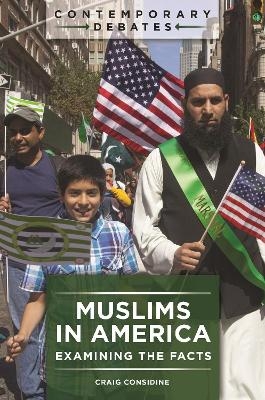
Muslims in America
ABC-CLIO (Verlag)
978-1-4408-6053-9 (ISBN)
Muslims in America: Examining the Facts provides an objective overview of the realities and experiences of Muslims in the United States, both historically and in the present day, and of their relationship with their fellow Americans. It surveys the history of American Muslims' settlement and integration into the United States; explores the dominant social, political, cultural, and economic characteristics of American Muslim families and communities; and studies the ways in which their experiences and beliefs intersect with various notions of American national identity. In the process, the book critically examines the more dominant social and political narratives and claims surrounding American Muslims and their religion of Islam, including false or malicious claims about their attitudes toward terrorism and other important issues. Muslims in America: Examining the Facts thus gives readers a clear and accurate understanding of the actual lives, actions, and beliefs of Muslim people in the United States.
Craig Considine is a faculty member of the Department of Sociology at Rice University. Considine is known for his interfaith activism and for his scholarship on Islam in the United States and Prophet Muhammad's relations with Christians.
How to Use This Book
Introduction
1 History of Muslims on American Soil
Q1. Did the first American Muslims arrive as slaves?
Q2. Did the U.S. Founding Fathers encourage the migration of Muslims to American soil?
Q3. Was a "Muslim nation" the first nation in the world to recognize the independence of the United States?
Q4. Does the United States have a history of passing legislation to prevent Muslims from migrating to American soil or gaining U.S. citizenship?
Q5. Did African American Muslims play a vital role in the emergence and success of the civil rights movement in the 20th century?
2 Demographics and Diversity
Q6. Are Muslims in the United States a diverse population in terms of ethnicity, culture, and religious identities?
Q7. Are American Muslims well educated, and have they contributed to scientific progress in the United States?
Q8. Do some organizations appear to reap financial benefits from anti-Muslim rhetoric and messaging?
Q9. Are Muslim women oppressed in the United States?
Q10. Do American Muslim voters adhere to one political ideology in terms of parties and social values in the United States?
Q11. Are there many "radical" mosques around the United States?
Q12. Do American Muslims engage in interfaith and intercultural dialogue with non-Islamic religious and cultural communities in America?
3 Politics
Q13. Are Muslims in the United States responsible for the majority of terrorist attacks on American soil?
Q14. Are there actual jihad training camps located in the United States?
Q15. Have U.S. politicians introduced legislation calling for a ban on Islamic law (sharia) in the American justice system?
Q16. Do Muslims in American society prefer to be governed by the U.S. Constitution rather than sharia?
Q17. Is the Council on American-Islamic Relations an actual "terrorist organization"?
Q18. Do Muslims in the United States condemn the radical beliefs and actions of militant groups such as ISIS and Al-Qaeda?
Q19. Do Muslim immigrants and Muslim refugees pose a threat to U.S. national security?
Q20. Are American Muslims opposed to same-sex relationships and marriage?
4 Islamophobia
Q21. Is Islamophobia on the rise in the United States?
Q22. Are Muslims in the United States more likely to be victimized by hate crimes than other minority populations?
Q23. Do Muslims face a significant amount of discrimination in terms of job opportunities and workplace experiences in the United States?
Q24. Do American media and the U.S. entertainment industry unfairly represent Muslims as violent people?
Q25. Does Islamophobia help ISIS and its sympathizers legitimate the "radical Islamic agenda"?
5 American National Identity
Q26. Are American Muslims happy to be living in the United States?
Q27. Did Muslims on American soil celebrate the 9/11 attacks in New York City and Washington, D.C.?
Q28. Have American Muslims served and died in the Armed Forces to protect the national security of the United States?
Q29. Do Muslims in the United States condemn "Islamic terrorism" and take action to combat extremism inside their communities?
Q30. Have American Muslims contributed to the well-being, vitality, and cultural enrichment of the United States?
Q31. Do Muslims in the United States support "American values" such as freedom of religion and freedom of speech as outlined in the First Amendment?
Index
About the Author
| Erscheinungsdatum | 14.08.2018 |
|---|---|
| Reihe/Serie | Contemporary Debates |
| Sprache | englisch |
| Maße | 156 x 235 mm |
| Gewicht | 567 g |
| Themenwelt | Geisteswissenschaften ► Religion / Theologie |
| Sozialwissenschaften ► Ethnologie | |
| Sozialwissenschaften ► Soziologie ► Spezielle Soziologien | |
| ISBN-10 | 1-4408-6053-X / 144086053X |
| ISBN-13 | 978-1-4408-6053-9 / 9781440860539 |
| Zustand | Neuware |
| Haben Sie eine Frage zum Produkt? |
aus dem Bereich


